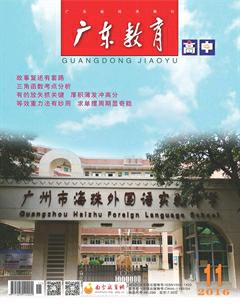短文改错中代词的12种考法
甄红
代词包括人称代词、物主代词、反身代词、不定代词、指示代词、疑问代词、连接代词、关系代词等,但连接代词和关系代词可放到从句中考虑,疑问代词在短文改错中尚末涉及到,实际只考查了前面5类代词,具体涉及12个方面,即12个微考点。
考点1:前后人称不一致
人称代词:
(2008年课标卷)...wed like to invite you to the exhibition. We would be grateful if you could join them that day.
解析:应指“加入到我们当中”才与上文的we一致,故改them为us。
物主代词:
(2016年Ⅰ卷) My uncle says that he never dreams of becoming rich in a short period of time. Instead, he hopes that our business will grow steadily.
解析:根据主语he和上下文可知,指“他的”生意,用形容词性物主代词his,故改our为his。
反身代词:
(2016年Ⅲ卷)I thought I knew everything and could make decisions by yourself.
解析:由句子的主语是I可知,是指由“我自己(myself)”作决定,故改yourself为myself。
考点2:前后单复数不一致
人称代词:
(2012年课标卷) I was happy when the toys worked, but when things went wrong, I got angry and broke it.
解析:指代前句中的the toys,是复数,应用them作broke的宾语,故改it为them。
(2014年大纲卷)Otherwise, it is impossible for him to help each other and to make their friendship last long.
解析:由help each other和后面的their可知,要用复数,故改him为them。
(2011年大纲I卷)Nang is a special kind of cake in Xinjiang. I like them very much.
解析:替代前句中的a specially kind of cake,是单数,故改them为it。
物主代词:
(2009年大纲I卷)The factory at the corner of Friendship Street and Zhongshan Road has been moved out of the city, and a sports center has been built in their place.
解析:指原来“那家工厂所在的”地方,单数,故改their为its。
考点3:前后性别不一致
人称代词:
(2010年大纲II卷)Before her leaving, I prepared a gift to show my best wishes to him. She said...
解析:由上下文中的she可知朋友是女的,这里突然变成男的了,前后性别不一致,应改him为her。
物主代词:
(2009年大纲II卷)A little girl was hurt and his mother needed help.
解析:应是指前面提到的“那个女孩的”妈妈,故改his为her。
考点4:代词的漏用
人称代词:
(2016年Ⅲ卷)At last, I will be on my own, but I still want to have my parents to turn to whenever need help.
解析:根据句子结构,whenever引导状语从句,从句中缺主语,应填代词;再根据句子意思,表示“我”需要帮助的时候,故在need前加I。
物主代词:
(2015年II卷) 5. One day, little Tony went to a shopping center with his parents...he turned around and found that his parents were missing...Five minutes later, Tony saw parents.
解析:意思是Tony见到了“他的”父母,故在saw后面加his。上文也有明显提示。
考点5:人称代词“格”的误用
也就是人称代词主语与宾语的误用。
(2007课标)Three years ago, Li Mings parents invited I to spend two wonderful weeks in Qingdao with them during the summer holiday.
解析:作invited的宾语,要用人称代词的宾格,故改I为me。
考点6:物主代词“性”的误用
也就是名词性物主代词与形容词性物主代词的误用。
(2009年课标卷)Im going to attend mine first lesson this afternoon, so Ive got some preparations to make. Keep in touch.
解析:在名词前作定语要用形容词性物主代词,指“我的(my)”第一堂课,故改mine为my。
考点7:人称代词与物主代词的误用
(2007年大纲I卷)I was only about six when he held his hand out to me. I took it in me and we walked.
解析:意思是将他的手放到“我的手(my hand)”里,相当于my hand,应用mine,故将in后的me改为mine。
考点8:反身代词与人称代词宾格作宾语的区别
(2013年I卷)He had a deep voice, which set himself apart from others...
解析:因做宾语的反身代词应与主语是指同一人或物,而此句为定语从句,其主语不是he,而是代表the deep voice的which,所以不能用himself,要改为him。意为:这种声音使“他”与别人分离,故改himself为 him。
考点9:such与so的误用
2. (2016年Ⅲ卷)At first, I thought I knew everything and could make decisions by myself. However, my parents didnt seem to think such.
解析:指代上文中think的宾语从句,用so,表示“这样”,故改 such为so。
考点10:many与much的误用
(2016年Ⅱ卷)It does not cost many, yet we can still learn a lot.
解析:意思是“不会花费许多(钱)“,指代不可数名词“钱(money)”,用代词much,不用many,故改many为much。
考点11:anything与everything的误用
(2009年课标卷)Im glad to say that anything has worked out fine in the dorm.
解析:因anything常用于否定句或疑问句中,这里不合适;作者是想说,很高兴告诉你,“一切(everything)”都很好,故改anything为everything。
考点12:this, that与it的误用
(2008年课标卷)We are organizing an art exhibition for high school students in the city. This will be held on the 9th of July in the Exhibition Hall of Beihai.
解析:指上句提到的“艺展”,即指代The art exhibition 用It,故改This为It。
尽管自2007年以来的全国卷只涉及以上12个考点,但以前没有考查到的并不代表以后也不会考,因此,除重点复习和关注以上12个考点外,要按考纲所列语法项目进行全面复习,才会在考试中左右逢源,游刃有余。
责任编辑 蒋小青

